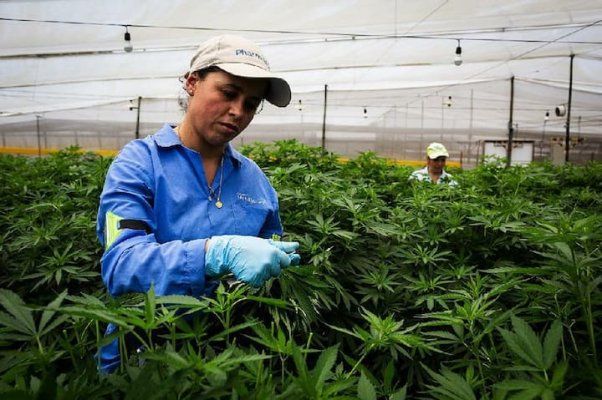Colombia announced last month that its cannabis exports increased 96% between November 2022 and January 2023.
In total, 13 companies from five departments sold products to 14 countries for a total of US$8.4 million. An analysis released on January 26 by ProColombia, a government agency responsible for exports and tourism, indicated that Argentina, Brazil, Australia, Switzerland, Israel, the United States and Germany were the main buyers.
According to Carmen Caballero, the president of ProColombia, 58% of these exports were headed to Latin America and the Caribbean.
According to Caballero, cannabis value-added goods have stood out for their quality and innovation in different regions of the country, especially for women.
Exports worth $8.4 million came from the following Colombian regions: Bogotá (48%), Cundinamarca (30%), Antioquia (12%), Santander (8%) and Magdalena (2%).
As part of ProColombia's strategy to generate development by strengthening the business fabric in the regions, nine of the 51 participating companies are located in eight municipalities [Nemocón, Cajicá, Rionegro, Ubaté, Pitalito, Mosquera, Tocancipá and Pasca] with less than 200,000 residents."
The department of Bogota, Cundinamarca, and Antioquia produced more than 90% of Colombian cannabis exports last year; however, 12 departments were identified in the analysis as having a high export potential for this type of product (Antioquia – Bolivar – Boyaca – Cauca – Cundinamarca – Huila – Magdalena – Meta – Risaralda – Santander – Tolima – Valle del Cauca).
Cannabis was produced in 13 countries, according to ProColombia, and exported to 14 countries, including Argentina (40%), Brazil (14%), Australia (12%), Switzerland (7%), Israel (6.5%), the United States (6%) and Germany (5.5%).
Extracts, medicines, and seeds were the most sought-after goods abroad, according to the agency.
Moreover, the second Medicinal and Industrial Cannabis Business Roundtable in November 2022 was organized by the Ministry of Commerce, Industry and Tourism, ProColombia, and Asocolcanna. There were 250 business appointments held at the meeting with 21 international buyers from ten countries and 51 small and medium-sized companies. Colombian products ranged from extracts to finished pharmaceuticals or cosmetics, according to the agency.
As a result of its warm and hospitable climate, Colombia is confident about the prospects of its cannabis cultivation in the long run.
The analysis last month noted the country's stable regulatory framework, which is one of the most comprehensive globally, incorporating measures spanning from seed to transformation, with added value generation and secure access for patients. Additionally, its environmental and geographic conditions permit four harvests annually in three forms (open sky, open sky with semi-automatic irrigation and indoor with light and irrigation) that are further enhanced by solar radiation reaching the region for 365 days a year, leading to increased crop yields and reduced production costs.
In addition, it is an industry that allows Colombia to develop scientifically and technologically, with an intensive R+D+i process that facilitates the establishment of research centers, according to ProColombia. Additionally, Colombia produces seeds, crude extracts, distillates, isolates, and finished products such as phytotherapeutics and cosmetics. All of this, meeting high quality standards, which will enable us to enter global value chains.”
Colombian senators passed an amendment legalizing cannabis in December.
In total, 13 companies from five departments sold products to 14 countries for a total of US$8.4 million. An analysis released on January 26 by ProColombia, a government agency responsible for exports and tourism, indicated that Argentina, Brazil, Australia, Switzerland, Israel, the United States and Germany were the main buyers.
According to Carmen Caballero, the president of ProColombia, 58% of these exports were headed to Latin America and the Caribbean.
According to Caballero, cannabis value-added goods have stood out for their quality and innovation in different regions of the country, especially for women.
Exports worth $8.4 million came from the following Colombian regions: Bogotá (48%), Cundinamarca (30%), Antioquia (12%), Santander (8%) and Magdalena (2%).
As part of ProColombia's strategy to generate development by strengthening the business fabric in the regions, nine of the 51 participating companies are located in eight municipalities [Nemocón, Cajicá, Rionegro, Ubaté, Pitalito, Mosquera, Tocancipá and Pasca] with less than 200,000 residents."
The department of Bogota, Cundinamarca, and Antioquia produced more than 90% of Colombian cannabis exports last year; however, 12 departments were identified in the analysis as having a high export potential for this type of product (Antioquia – Bolivar – Boyaca – Cauca – Cundinamarca – Huila – Magdalena – Meta – Risaralda – Santander – Tolima – Valle del Cauca).
Cannabis was produced in 13 countries, according to ProColombia, and exported to 14 countries, including Argentina (40%), Brazil (14%), Australia (12%), Switzerland (7%), Israel (6.5%), the United States (6%) and Germany (5.5%).
Extracts, medicines, and seeds were the most sought-after goods abroad, according to the agency.
Moreover, the second Medicinal and Industrial Cannabis Business Roundtable in November 2022 was organized by the Ministry of Commerce, Industry and Tourism, ProColombia, and Asocolcanna. There were 250 business appointments held at the meeting with 21 international buyers from ten countries and 51 small and medium-sized companies. Colombian products ranged from extracts to finished pharmaceuticals or cosmetics, according to the agency.
As a result of its warm and hospitable climate, Colombia is confident about the prospects of its cannabis cultivation in the long run.
The analysis last month noted the country's stable regulatory framework, which is one of the most comprehensive globally, incorporating measures spanning from seed to transformation, with added value generation and secure access for patients. Additionally, its environmental and geographic conditions permit four harvests annually in three forms (open sky, open sky with semi-automatic irrigation and indoor with light and irrigation) that are further enhanced by solar radiation reaching the region for 365 days a year, leading to increased crop yields and reduced production costs.
In addition, it is an industry that allows Colombia to develop scientifically and technologically, with an intensive R+D+i process that facilitates the establishment of research centers, according to ProColombia. Additionally, Colombia produces seeds, crude extracts, distillates, isolates, and finished products such as phytotherapeutics and cosmetics. All of this, meeting high quality standards, which will enable us to enter global value chains.”
Colombian senators passed an amendment legalizing cannabis in December.




